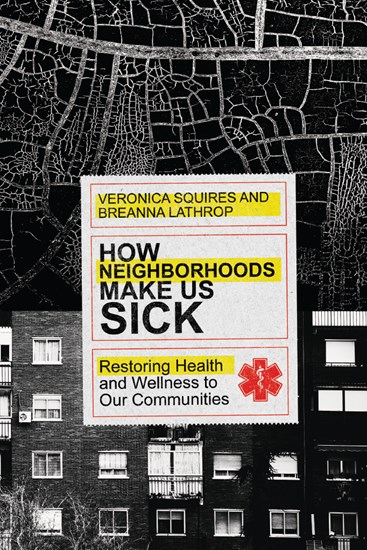
Our neighborhoods are literally making us sick.
Buildings with mold trigger asthma and other respiratory conditions. Geographic lack of access to food and health care increases childhood mortality. Community violence traumatizes residents. Poverty, unemployment, inadequate housing, food insecurity, racial injustice, and oppression cause physical changes in the body, resulting in disease and death.
But there is hope. Loving our neighbor includes creating social environments in which people can be healthy. While working in community redevelopment and treating uninsured families, Veronica Squires and Breanna Lathrop discovered that creating healthier neighborhoods requires a commitment to health equity. Jesus' ministry brought healing through dismantling systems of oppression and overturning social norms that prevented people from living healthy lives. We can do the same in our communities through addressing social determinants that facilitate healing in under-resourced neighborhoods.
Everyone deserves the opportunity for good health. The decisions we make and actions we take can promote the health of our neighbors.
"The real and lived experiences of Veronica and Breanna are indicative of how where you live impacts your mental and physical health, regardless of your socioeconomic status. They are dedicated servant leaders who have a heart toward health equity and made it their purpose to immerse themselves in communities with the greatest needs."
"The time is right for an insightful, well-documented exposé of the pathology in poverty neighborhoods and a road map for the journey toward health and wholeness. How Neighborhoods Make Us Sick is just that. Turning troubled communities around is no small challenge, the authors admit. But there are practical steps that have proven to be effective. This is essential reading for anyone engaged in service among the poor."
"Framed expertly in terms of the macrolevel social determinants of health and the gap in life expectancy between poor neighborhoods and wealthier ones, this heartfelt first-person account by two staff members of Atlanta's Good Samaritan Health Center makes vivid the microlevel daily pain and struggles of those who live in poverty. It also outlines an activist, social justice approach to making the changes that have to be made with and by community members, in order for neighborhoods to produce health, and not harm, to their residents."
"In my thirty years of working in health nonprofits, I've never come across a book that puts a real face on the socioeconomic and geographic disparities that truly exist in health care. I recommend this book to anyone interested in the stark realities of providing health services to vulnerable populations from two compassionate, remarkable women working and living in the trenches, while providing a roadmap to community wellness."
"At a time where words like poverty, injustice, mental health issues, trauma, and the like have become familiar to our common justice narrative, we are in need of a deeper dive into how these systemic barriers truly impact communities. Veronica and Breanna have generously invited us into their realm by sharing their experiences and learned expertise in an effort to help illuminate the need for deeper awareness and collective action toward the flourishing of poor communities."
"Through compelling stories, this eye-opening book illuminates the inverse relationship between poverty and health of all kinds. It acknowledges both the complexities and hard realities in addressing needs that often feel overwhelming. And ultimately, it points to hopeful strategies that flow from taking ownership of both the problem and the solution."
"How Neighborhoods Make Us Sick was a disturbing read because in its pages I saw descriptions of where my two young-adult, adopted, biracial sons potentially would be if they did not have the safety net of financially secure parents behind them. The authors are realistic about the complexity of the problems that those with limited resources face. They avoid simplistic answers while offering possible solutions for greater overall health. Maybe there is hope after all."
"How Neighborhoods Make Us Sick is an excellent and desperately needed addition to the nursing literature on community and social justice. Impressive for its narrative style that provides accessibility, relevance, and a guide for praxis, Veronica Squires and Breanna Lathrop detail their journeys and desires to help the most vulnerable in society and offer us a glimpse into the transformation of mere practice into praxis—practice that is intentionally aimed at social justice goals. Their pathways to praxis are substantiated by their poignant and pragmatic accounts of emerging awareness, deep self-reflection, risk taking, choosing change, and taking action to transcend present circumstances for both their clients and themselves. A mandatory book for current times as nurses expand their scope and locus of practice into the community. How Neighborhoods Make Us Sick is an amazing example of emancipatory nursing. It will transfix and engage any health care provider seeking to reduce suffering by uncovering and challenging systemic barriers to better society and quality of life through true praxis."
CONTENTS
Foreword by Dr. Keri Norris
Part One: How We Get Sick
1. Two Journeys to the Inner City
2. What is Making Us Sick? An Introduction to Social Determinants of Health
3. The Trauma of Poverty
4. Working to Death: Employment and Social Status
5. Kool-Aid in a Baby Bottle: Food Insecurity and Nutrition
6. Longevity and Learning: Education and Child Development
7. When Housing Hurts: Environmental Factors
8. The Challenge of Getting Well: Health Care Access in the United States
9. The Unmaking: On Moving Out and Rebuilding
Part Two: How We Get Well
10. A New Beginning: What Will Make Our Neighbors Healthy?
11. The Good Sam Story
12. Poverty: Addressing a Distant Disease
13. Hired and Healthy
14. Growing Health from the Ground-Up
15. A Healthy Start
16. A Place to Call Home
17. Reenvisioning Health Care
18. Rx for Change: An Approach to Activism
Epilogue: Toward a Better Way
Acknowledgments
Discussion Questions
Notes
Subject Index














